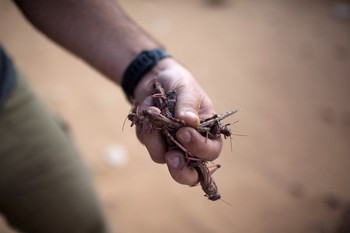FAO warns of uptick in locust breeding threatening Sudan
November 16, 2015 (KHARTOUM) – The Food and Agriculture Organization of the United Nations (FAO) warned that unusually heavy and widespread rains that fell recently in northwest Africa, the Horn of Africa and Yemen could favour desert locust breeding.
 “Extreme weather events, including torrential downpours, have the potential to trigger a massive surge in locust numbers. Rain provides moist soil for the insects to lay their eggs, which in turn need to absorb water, while rains also allow vegetation to grow which locusts need for food and shelter,” said Keith Cressman, FAO Senior Locust Forecasting Officer.
“Extreme weather events, including torrential downpours, have the potential to trigger a massive surge in locust numbers. Rain provides moist soil for the insects to lay their eggs, which in turn need to absorb water, while rains also allow vegetation to grow which locusts need for food and shelter,” said Keith Cressman, FAO Senior Locust Forecasting Officer.
“The effects of a locust plague can be devastating on crops and pastures and thus threaten food security and rural livelihoods,” he added.
FAO said that in the winter breeding areas along both sides of the Red Sea, seasonal rains began in early October, which is slightly earlier than normal.
“If the rains continue, there would be sufficient time for two generations of breeding to occur this year in the coastal areas of Sudan, northern Eritrea, southeast Egypt, Saudi Arabia and Yemen”.
FAO emphasized that prevention through early warning and early reaction is the key in reducing damage caused by desert locust on agricultural areas.
“After unusually heavy rainfall, it is imperative that countries mount the necessary field surveys and maintain them on a regular basis for routine monitoring of breeding conditions and locust infestations. The finding of significant infestations requires control operations to avoid a further escalation in locust numbers. It is critical that the results of survey and control operations are reported quickly and accurately so that swift decisions can be taken to prevent the spread of locusts to other countries”.
FAO noted that it operates a desert locust Information Service that receives data from locust-affected countries. This information is regularly analysed together with weather and habitat data and satellite imagery in order to assess the current locust situation, provide forecasts up to six weeks in advance and if required issue warnings and alerts.
In 2013, FAO provided USD $500 000 in assistance to support the Government of Sudan’s efforts to mitigate locust outbreaks and improve capacity to prevent future outbreaks.
More recently, the Ministry of Agriculture and Forests along with FAO led a training for the Plant Protection Directorate on Pest Risk Analysis (PRA) in order to strengthen national early warning and early action capacity in Sudan.
(ST)
